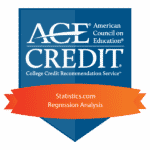
- June 12 – July 10: Introduction to Statistical Issues in Clinical Trials
See you in class!
Covid-19: Sensitivity, Specificity and More
Covid-19 has brought statistical concepts and terms into the popular news as never before. One confusing tangle is the array of terms surrounding diagnostic test results – sensitivity, specificity, accuracy, precision, false positives, false negatives, and more. Let’s untangle them.[…]
Word of the Week
Sensitivity and Specificity
We defined these terms already (see above), but how can you remember which is which, so you don’t have to look them up? If you can remember the order in which to recite them – sensitivity then specificity, it’s easy. Think “positive and negative” and, applying the same order, you measure the percent of positives (negatives) correctly identified. […]
Student Spotlight
Timothy Young, Contracts Administrator, County of Los Angeles
Timothy recently started the Data Science Analytics Bachelor’s Degree program that Statistics.com offers in conjunction with Thomas Edison State University (TESU) and has already been able to put his learning to work. At his job, using skills acquired at Statistics.com, he has implemented process improvements to streamline the contract procedure.

Course Spotlight
Introduction to Statistical Issues in Clinical Trials(June 12 to July 10)
You will learn how to
- Identify the phases in clinical trials and their scope (new drugs, devices, etc)
- List the principles of good trial design
- Specify designs for case studies with different endpoints
- Conduct analysis for several different endpoint designs
Your instructor is Dr. Nand Kishore Rawat, a Portfolio Director of Clinical Research Services at Cytel Statistical Software & Services. His team has pioneered the use of flexible and adaptive designs in clinical trials; Cytel also brings you this really cool dashboard for reviewing and filtering the 800+ clinical trials in progress for Covid-related treatments and vaccines.
Analyzing and Modeling Covid-19 Data (June 12 to July 10)
See you in class!

